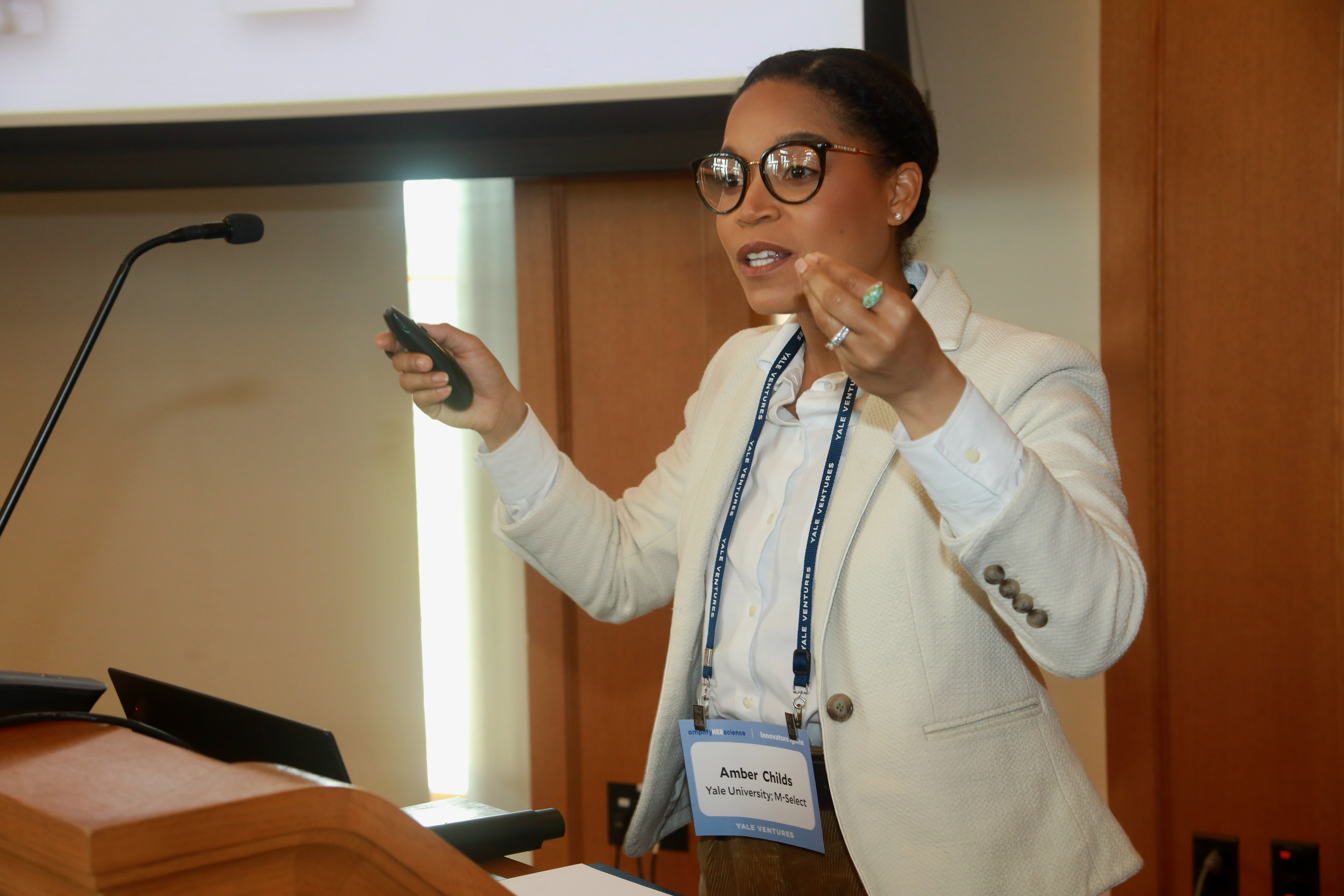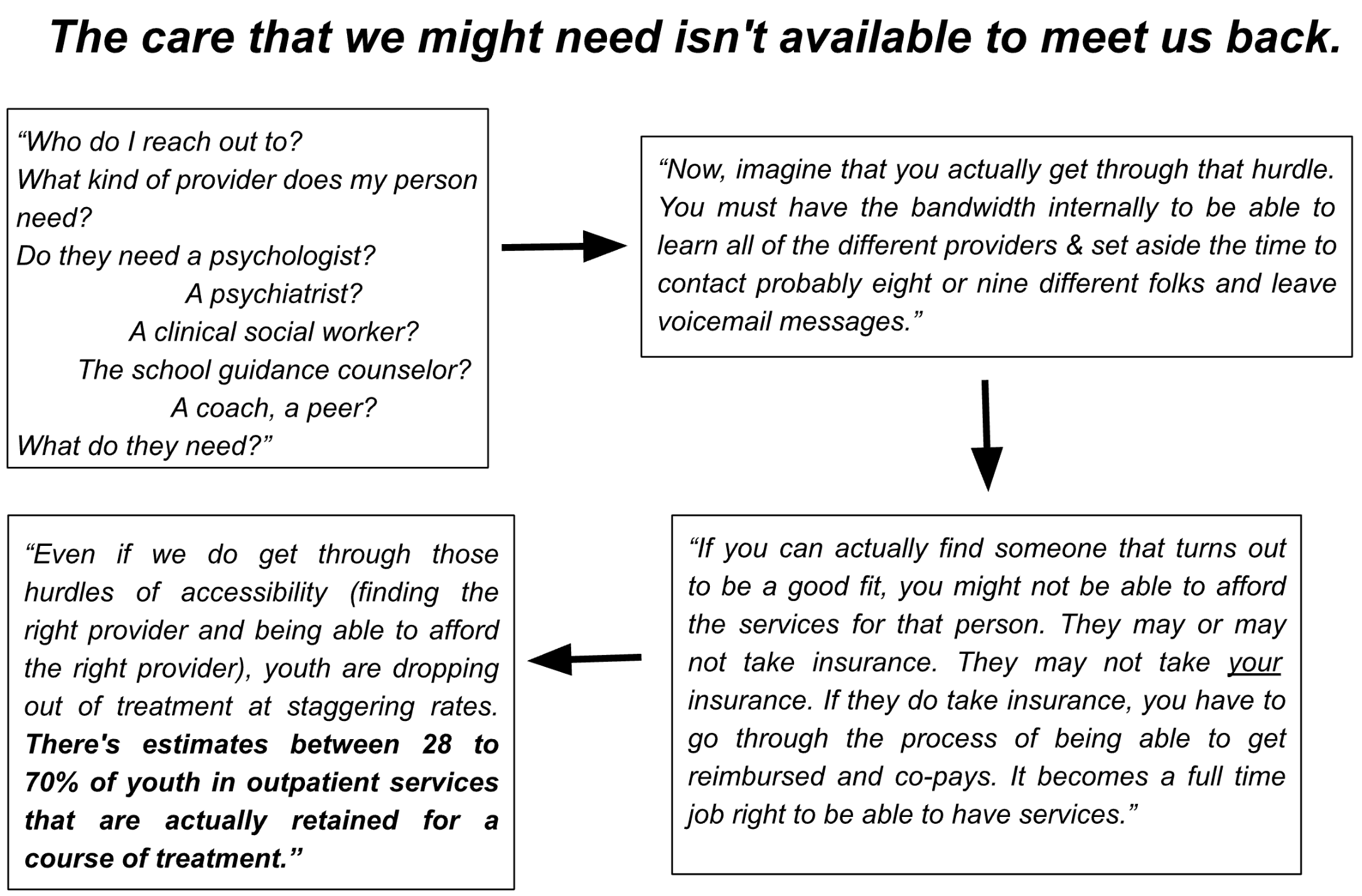Innovator Spotlight: Dr. Amber Childs on the current mental health crisis and identifying as an entrepreneur

Amber Childs presenting M-Select at Innovators Ignite, March 2023
Dr. Amber Childs is a clinical psychologist and assistant professor of psychiatry at the Yale School of Medicine. She is a child and adolescent specialist in mental health, and a national leader in advancing evidence-based, data-driven behavioral health. Dr. Childs strives to improve equity, access, and outcomes in the psychiatric field. In addition to her research, Dr. Childs is an entrepreneur and the founder of M-Select, a digital platform that provides teenagers with necessary evidence-based treatment, while assisting providers with the implementation of measurement-based care (MBC) practices.
In this interview, Dr. Childs shares her expertise on the current mental health crisis, the functionality and need for MBC implementation, and how her venture, M-Select, is connecting the dots. She also shares her experience as a woman of color in both academia and entrepreneurship.
#1 You were quoted in a New York Times Article “The pandemic really just turned up the volume on a soundtrack that was already playing.” As an expert in behavioral health, how do you describe the mental health crisis and its urgency?
In the 10 years before the pandemic, rates of depression for teenagers aged 12 to 17 had gone up by 40%, and deaths by suicide for youth aged 20 to 24 increased by 57%. LGBT youth were four times more likely to attempt suicide; deaths by suicide in black youth were up by 60%. So, prior to the pandemic even happening, our teenagers were in a mental health crisis. And that's really only dipping our toes into the more prominent issues. These statistics aren’t even touching areas of anxiety or other mental health issues.
On Valentine's Day this year, the CDC released data that showed the highest recorded rates of depression in adolescent female-identifying youth. This is not a new problem, but it has become exacerbated and exponential in the last couple of years. People now have to pay attention in a way that they hadn't before.
#2 In your experience, why are teenagers not seeking care? Does the problem lie at accessibility, affordability, stigma/lack of desire, or all three?
It may not even be that teenagers are not seeking care so much as there isn't care to meet them back. Knowing where to start is a tremendous, tremendous hurdle:

We need to have services that are designed to meet the specific needs of youth, and we can't be retrofitting services that are built for adults, in a system that's built for adults, and expect that that's going to map onto teenagers. The way that teenagers have begun to engage socially and interpersonally has really shifted over time, and we need to make sure that our services are aligning with those shifts.
#3 You are the founder of M-Select, a digital platform to assist providers with measurement-based care (MBC) implementation. How did you come up with the idea & how has the journey been thus far?
Measurement based care is, essentially, collect, share, and act. It's collecting client-reported data about what the patient says is happening in their mental health experience, sharing that data back with them, because it ultimately belongs to them, and then engaging in a really transparent, collaborative discussion about how the data fits their subjective experience. What can we, together, learn from these data to then act and make meaningful changes to the patient’s care? Measurement based care is associated with 20% less drop-out from treatment.
On where the idea for M-Select came about, Amber asked herself: “How do I both provide teenagers with evidence-based treatment that they need, that is infused with measurement based care, and then as a function of that, make sure that whatever clinical provider on the other side is able to benefit from those data driven insights? That's how we get measurement-based care to happen. M-Select is really about patient empowerment, with the patient being in the center, not the provider.”
#4 As a woman of color, can you describe the challenges you have faced, how you have overcome them/are overcoming them, and how, in your opinion, how our community can better support women in science?
The biggest challenge for me in my initial journey had been understanding and identifying as an innovator and entrepreneur. A lot of the messages that I was receiving was ‘you are an amazing executor,’ but I don't think it had been fully appreciated that I was actually the idea and vision generator, and also the person executing on those ideas. There were people around me willing to take credit for being the idea-generator. I think it goes back to the idea that as a woman, and as a woman of color in particular, the idea of being a good collaborator is something that is really salient; Being a good collaborator means you’re willing to take on additional things, you do it for the sake of the team and not for the sake of the self, and certainly you don’t try to play into any stereotypes of being overly aggressive or assertive (‘actually, that was my idea’), because it would confirm for people that ‘she’s just not a good collaborator’. That was an internal conflict I had with myself for a while, really being able to step up and take credit for something, but in this instance [with M-select], I said “no, this is my idea and I believe in this.
Frank Fortunati said to me, ‘no Amber, you are an ideas person, you are not just an executor.’ Being able to have a clear voice from someone in a prominent leadership position was so important for me. Having people that can support you is critical if we are going to have women and women-of-color leaders come forward and thrive.
#5 What is your best advice for other women interested in entrepreneurship?
1) Believe yourself. Not even “believe in yourself,” but “believe yourself.” There is probably a little voice inside of you that is saying to you, ‘you are a visionary, you have ideas!’ Believe yourself, because there are going to be other voices and influencers that try to dissuade you from that fundamental truth about yourself. Really try to nurture that voice, seed it, water it, and let it grow.
2) There are no shortcuts. In order to do this [entrepreneurship], it demands your full self, and all of the different things that you bring to the table when you are doing your best work. That is a place where I really thrive - I love getting down to the nitty-gritty.
3) It is okay to feel fearful and uncertain. Trust that you will surround yourself with the resources, the community, and the support to move through that fearfulness or uncertainty. These feelings will show up: you are not on the wrong track if you feel uncertainty or if you start to feel the discomfort of being somewhere new; You’re edging into something that is probably the right place for you- so, explore that, don't panic, get to know it a little bit, and see if it makes sense for you. Continue to move through it.
4) As much as you can, show up as your full self. I don’t think I had been my fullest self until I started to step into this entrepreneur/innovator side of the house. I have gotten to where I have so far, in part, because I have allowed myself to be as authentic as I can. I only talk about stuff that I believe in. I am only working on stuff I believe in. I am only doing all of this stuff as hard as I possibly can for things that I truly, truly believe in. There is no way to fake that, and in order to do that, you have to just bring your fullest, fullest, self. So, to the extent that you can do that also helps you know you are on the right track.
This interview was written and compiled by Sonia Seth, Yale SOM ’25, a Yale Ventures summer associate.
